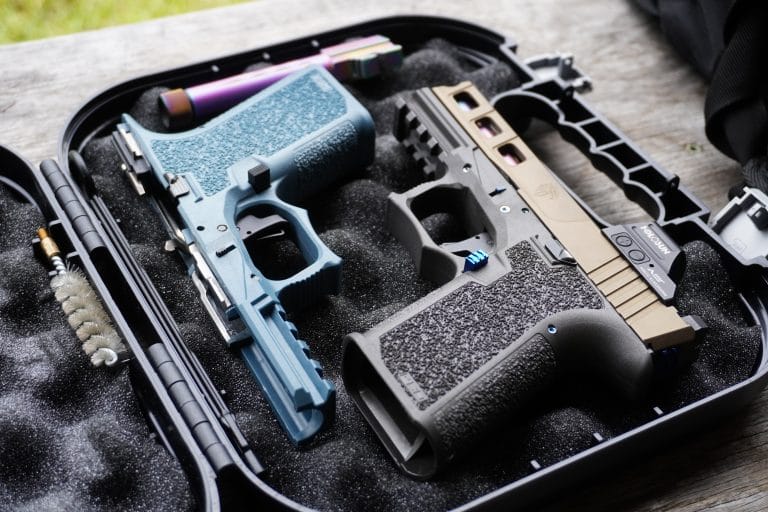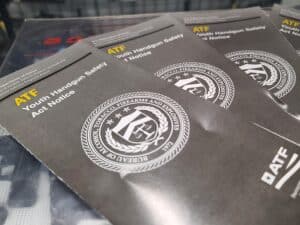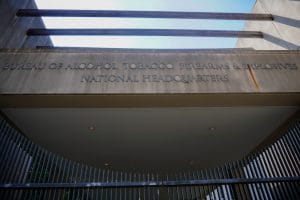The country’s largest unfinished firearm parts maker is no longer subject to President Biden’s ban on homemade gun kits.
On Sunday, Judge Reed O’Connor of the U.S. District Court for the Northern District of Texas, a George W. Bush appointee, decided the Bureau of Alcohol, Tobacco, Firearms, and Explosive (ATF) can’t enforce its new “ghost gun” rule against Polymer80. He found the ATF exceeded its authority when it attempted to reinterpret what constitutes a firearm in order to restrict sales of unfinished parts and homemade gun kits.
“The Final Rule’s redefinition of “frame or receiver” conflicts with the statute’s plain meaning. The definition of ‘firearm’ in the Gun Control Act does not cover all firearm parts. It covers specifically ‘the frame or receiver of any such weapon’ that Congress defined as a firearm,” Judge O’Connor wrote in Polymer80 v. Garland. “That which may become a receiver is not itself a receiver.”
The ruling comes just a few weeks after Judge O’Connor issued a similar order in a separate case involving several other major makers of unfinished gun parts. It further restricts the ATF’s ability to enforce its “ghost gun” rule, dealing a blow to President Joe Biden’s attempts to unilaterally implement new gun restrictions through ATF rulemaking. Taken together with the full Fifth Circuit’s decision to strike down the bump-stock ban, it also spells more bad news for President Biden’s more recent pistol-brace ban.
Unfinished gun parts and homemade gun kits have been at the center of the gun-control debate for years because they can be sold without serial numbers or background checks since they require significant finishing to be made into functional firearms. The Biden Administration has sought to expand the definition of “firearm” so that those selling the unfinished part would be considered “engaged in the business” of making and dealing firearms. That would require them to obtain federal licenses to make and sell their products. Gun-rights advocates have opposed the expansion of ATF power because they believe it threatens their Second Amendment rights.
However, this case was not decided on Second Amendment grounds. Instead, Judge O’Connor ruled the ATF’s actions violate the Administrative Procedure Act (APA), which governs how much latitude federal agencies have when interpreting and enforcing federal laws.
“[T]he Court stands by its earlier reasoning and finds that Plaintiff has demonstrated a strong likelihood of success on the merits of its claims that the Final Rule—specifically, 27 C.F.R. §§ 478.11, 478.12(c)—exceeds the scope of ATF’s authority under the Gun Control Act,” he wrote.
Judge O’Connor chastised the ATF for ignoring the limits of its power under federal law and accused the agency of trying to confuse the issue through clever wordplay.
“Despite Defendants’ arguments to the contrary, ATF has no general authority to regulate weapon parts,” he wrote. “But the Final Rule grants ATF that general authority by copying language used throughout the statutory definition. It takes phrases like ‘designed to’ and ‘may readily be converted’ and ‘assembled’ from various places in the statute, cobbling them together to form ATF’s own definition of ‘firearm. Those terms may add a patina of credibility to the drafting, but they tarnish Congress’s carefully crafted definition. More importantly, they unlawfully expand ATF’s authority beyond the boundaries set by the Act.”
His ruling mirrored what he wrote in VanDerStok v. Garland when deciding the rule couldn’t apply to another top-gun-parts maker. In that case, Judge O’Connor ruled that “[t]he Government’s likely ultra vires enforcement efforts upset decades of ATF regulatory precedent against a public that has relied on that historic posture” and “the liberty interests of law-abiding citizens wishing to engage in historically lawful conduct (dealing in now-regulated parts)—which Defense Distributed shares—outweighs the Government’s competing interest in preventing prohibited persons from unlawfully possessing firearms.”
Polymer80 celebrated what they called a “massive win.” It began taking orders for its unfinished parts and tool kits on Monday.
“Polymer80 has been granted a temporary restraining order and preliminary injunction allowing us to resume selling and shipping our quality pistol frame kits which will include the pistol frame, jig, and associated components as one,” Loran Kelley, the company’s founder and CEO, said in a social media post.
The Department of Justice, which represents the ATF in court, did not respond to a request for comment. However, the ATF appears undeterred by the ruling. On Tuesday, the agency released a public safety advisory warning Americans against dealing in unfinished firearms parts.
“People who engage in the business of dealing firearms are subject to the Gun Control Act,” ATF Director Steven Dettelbach said in a statement. “That means they need to run background checks and sell guns with serial numbers. That is what the ghost gun rule is about. Today’s advisory is simple. If you’re dealing firearms — including items that can be readily converted to a working firearm — ATF is going to make sure that you are following the same laws as everyone else.”
Kelley promised Polymer80 would continue to oppose the ATF’s attempts to restrict the sale of unfinished gun parts.
“This massive triumph over clearly unconstitutional overreach and abuse of power is a hard-won victory in a larger war,” he said. “Know that Polymer80 is not done!”






